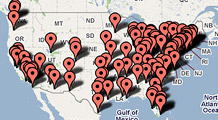Meeting a loan servicer face-to-face
Chase puts servicers in branches and mortgage centers to work with troubled borrowers and housing counselors. But some experts say access isn't the main problem.

PARAMUS, N.J. (CNNMoney.com) -- All too often, troubled homeowners struggle nearly as much to reach their loan servicers as they do to pay their mortgage.
JPMorgan Chase is aiming to ease the process by opening homeownership centers where borrowers and counselors can meet with servicers face-to-face. A main criticism of servicers is that borrowers call toll-free numbers only to sit on hold for hours and then get lost in a maze of departments and voicemails.
Servicers can work with borrowers who are behind in their payments to modify their mortgagers to more affordable terms.
The bank, one of the nation's largest servicers, has opened 24 centers since mid-February in communities with high foreclosure rates -- starting with Glendale, Calif. Representatives can handle loans serviced by Chase, Washington Mutual and Bear Stearns' EMC unit. Chase acquired the latter two institutions in 2008.
While housing counselors generally applaud the effort, some say that it may not ultimately result in more modifications. The true obstacle, they say, isn't access to servicers, but their willingness to adjust loan terms.
The latest location is in Paramus, N.J., which opened Thursday. At the kickoff, Chase officials told local housing counselors that they can be assigned one of the center's seven servicing representatives to work with, streamlining the modification process.
"We can take more time to understand their situation," said Judith Lockhart, Eastern regional manager for the centers.
Applications submitted there will be reviewed by a separate team at the bank's central processing division and decisions could take as little as three weeks. Center representatives will be able to rule on applications under the Obama administration's foreclosure prevention plan, which the bank expects to implement in coming weeks.
Representatives don't expect to handle a flood of walk-ins to the center, which is housed in a mortgage origination office. Most of their applications, they say, will come from non-profit and municipal housing agencies, as well as referrals from bank branches.
Housing counselors said the centers could make their jobs easier. Though many advocates already know the names and numbers of whom to call at servicers' central processing hubs, being able to work with someone locally will cut down on the waiting time.
"They get back to you a lot sooner," said Gail Davis, housing counseling supervisor at Tri-City Peoples in East Orange, N.J. "It will take less time."
Borrowers having trouble getting help over the phone can come into the office and work with the same person throughout the process, said E. Michael Taylor, director of housing and community development for New Jersey's Essex County.
"Here you look at somebody and feel you are dealing with an individual instead of a bank," he said.
Chase (JPM, Fortune 500) isn't the only servicer offering face-to-face assistance, though others aren't putting representatives in retail locations. Other banks attend hundreds of one-day events nationwide where troubled borrowers can meet with their servicers.
"A lot of people are more comfortable when they are able to meet directly with someone," said Rick Simon, spokesman for Bank of America (BAC, Fortune 500), which held more than 400 events last year and has modified more than 300,000 loans since January 2008.
Not all housing experts are convinced Chase's centers will result in fewer foreclosures. The biggest obstacle to loan modifications has been servicers' willingness to change mortgages' terms so monthly payments are more affordable.
"It's not that hard to get access," said Jack Guttentag, a Wharton School of Business professor emeritus who runs the Mortgage Professor Web site. "The problem is what happens after you get the access." ![]()


